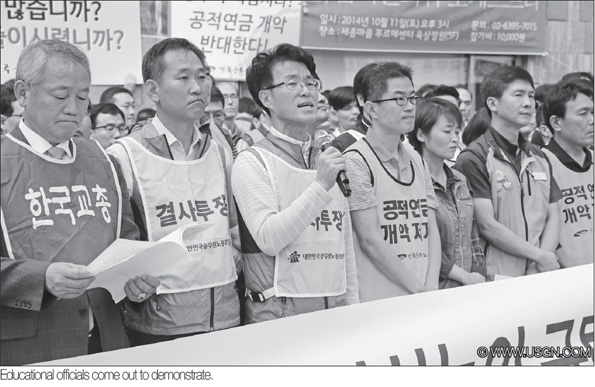
Nowadays, one of the hottest issues in Korea is the reform of the public pension. The group directly influenced by the reform is only government officials, but it became a social issue because other people who are indirectly influenced by the reform also have an interest in it. For example, there are the officials’ families, people who are preparing for civil service exams, and people who are interested in social issues.
The types of pensions in Korea mainly can be divided into two types, the public pension and the private pension. The public pension is managed by the government, and it includes the public officials’ pensions, the national pension and the military pension. It is the public officials’ pensions that the government is about to reform. Why is the government pushing ahead with the reform despite much controversy? The most important reason is the national finances. The public pension was introduced by the government in 1960 to compensate for the low salary of public officials. At that time, giving the pension to retired officials was not a problem because there were few retired officials, but many things have changed in 50 years. From an extension of the average life expectancy, the number of retired officials increased tremendously. It means that the gross amount of the pension the government spends exponentially increased. On the other hand, the number of officials in service hasn’t increased as much as the retired officials, so the government has trouble in securing a budget for retired public officials. Consequently, to supplement the deficit of the public pension, the government uses a tax for people who are not officials. Thus, the public pension should be reformed to fix the deficit of the budget.
Making officials pay more contributions and taking smaller pensions are the goals of the reform plan submitted by the government. In the existing system, officials and the government pay 7% respectively, but it will gradually increase to 9% by 2018. Also, the government announced that it will gradually reduce the rate of return on the pension from 1.9% to 1.7%, and the reform plan includes clauses preparing for an aging society. Now, officials will receive their pension when they become 60 years old, but the reform plan will make officials receive their pension later when they become 65 years old. Moreover, when an official dies, their spouse receives 70% of the public official’s pension, but it will be reduced to 60%.
Briefly, the goals of the reform plan of the public pension are making officials pay more money, taking less money, and paying longer. One of the most important reasons for becoming an official is taking a steady income after retirement. In terms of officials, it is understandable that they can’t accept the reform plan giving them such a disadvantage, but there are also other groups showing dissatisfaction about the reform plan.
What is another problem other than taking money from officials? Chungbuk National University’s economics professor Lee Dong-soo said, “The problems of the reform are a lack of fairness and rapid progression. Actually, the public pension is just one part of the deficit of national finances. There is always a lack of national finances because Korea spends a lot of its budget on the welfare system in spite of a low tax rate imposed on the people. Therefore, the government is about to make the reform of the public pension to make up for the tremendous financial deficit. The controversy is why the government is only reforming the public pension. Currently, the deficit is not only from the public pension but also public enterprises and the pension of legislators. Even though legislators take more pension than officials, they are not included in the reform.” Professor Lee also pointed out, “The government is carrying out the reform too radically because an adjustment of welfare must be carried out within a certain time, about 20 to 30 years.”
Most of the experts insist that the reform of the public pension must be conducted to relieve the burdens of the future generations. However, officials point out the irrationality of the reform, which doesn’t have fairness. As expected, the reform, which is currently being presented by the government, made a lot of controversy. It means that arguments about the reform are not over, so whether the government can make the reform satisfying to all groups or not is under scrutiny by the public.
By Yoo Han-bin
hb36@cbnu.ac.kr


 All
All Society & Global
Society & Global






 Yoo Han-bin
Yoo Han-bin











